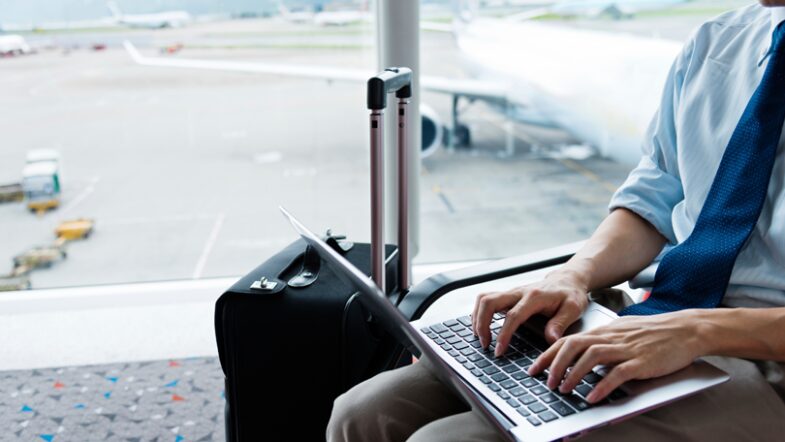Laptops have become an essential tool for professionals, students, and anyone who needs to work on the go. However, commuting with a laptop can be risky, as it’s susceptible to accidental damage or theft. Whether traveling by public transport or walking to your destination, taking precautions to protect your laptop is essential.
We have noticed that people usually do not have such an approach to this type of problem. They usually think something like that won’t happen to them, especially if they are careful all the time. But laptops can damage even if you haven’t done anything wrong. It is always better to prepare for things like that instead of finding yourself in a situation where you can do nothing to fix the problem.
In this article, we’ll provide tips for laptop protection while commuting to help you keep your laptop safe and secure. By following these tips, you can ensure that your laptop remains in good condition and that your data is safe from potential threats.
1. Use a Laptop Sleeve or Case

Source: customlogocases.com
A laptop sleeve or case is an essential accessory for laptop protection while commuting. It serves as the first line of defense against accidental bumps, scratches, and drops. A good laptop sleeve or case should provide a cushioned layer to absorb any impact and protect the laptop from damage.
It should also fit the laptop snugly, leaving no room for movement that can cause further damage. When purchasing a laptop sleeve or case, choosing one that matches your laptop’s size and style is essential. This way, you can protect your laptop adequately while maintaining its sleek appearance.
2. Avoid Overstuffing Your Bag
Overstuffing your bag is a common mistake that can lead to laptop damage. When commuting, throwing everything into one bag is easy, but this can put unnecessary pressure on the laptop. To avoid this, choose a bag with a dedicated laptop compartment that provides additional padding and protection. This way, the laptop can be kept separate from other items and won’t be subjected to unnecessary stress.
But we also understand that overstuffing is the only choice in some cases. You won’t manage to avoid this problem if you do not have an adequate bag or backpack for your laptop. That is the reason why we strongly recommend paying more attention to finding a leather laptop backpack that will ensure you easily put all the necessary stuff in one place without overstuffing the bag. These bags are usually big enough, durable, and have a strong structure.
3. Keep Your Laptop Close to You

Source: pcmag.com
If possible, keeping your laptop close to you at all times is one of the habits you should have. Never leave your laptop unattended, especially in public places like cafes, train stations, or airports. When carrying your laptop, using a separate bag instead of a backpack is also one of your alternatives.
This way, you can keep the laptop close to your body and have better control over it. If possible, try to avoid crowded areas or keep your laptop hidden from view to deter potential thieves.
4. Use a Security Cable
A security cable is a useful tool for laptop protection. Unfortunately, most people are not even aware of that. The security cable allows you to lock your laptop to a fixed object like a desk or table, making it difficult for someone to steal it. A high-quality security cable will have a strong lock and cable that can withstand any attempts at cutting or tampering.
When using a security cable, it’s essential to attach it to a sturdy object and ensure that the cable is taut. This way, the laptop will be secured, and you can have peace of mind.
5. Turn Off Your Laptop Before Transporting

Source: freecodecamp.org
Before transporting your laptop, it’s essential to turn it off properly. This will prevent any damage to the hard drive or other internal components.
Shutting down the laptop ensures that all programs and processes are safely closed before being transported. Additionally, removing any external devices like USB drives or headphones that can get damaged while in transit is essential.
6. Use Password Protection
Using password protection is one of the crucial security measures for laptop protection. It’s a simple yet effective way to prevent unauthorized access to your laptop and data.
A strong password should be used, consisting of a combination of letters, numbers, and symbols. It’s also good to enable features like two-factor authentication or fingerprint recognition for extra security. This way, only authorized individuals can access your laptop and data.
7. Backup Your Data Regularly

Source: cmitsolutions.com
Backing up the data on your laptop should be some sort of habit. You never know what bad could happen to your device. Unfortunately, most people do not do that regularly. Some group of people does not even do that at all, which is a huge mistake.
Backing up your data ensures that your data is safe in case of theft or damage. Cloud storage services like Google Drive or Dropbox can automatically sync your files across multiple devices, making it easy to access your data from anywhere. Alternatively, you can manually back up your data with an external hard drive or USB drive. This way, you can recover your data quickly and avoid losing any important files.
8. Install Antivirus Software
Installing antivirus software is another crucial step in laptop protection. It helps to protect your laptop from viruses, malware, and other cyber threats that can compromise your data and system. Antivirus software can scan your laptop regularly for potential threats and remove them before they cause harm.
Choosing reputable antivirus software and keeping it updated to ensure maximum protection is a crucial step most people forget about. By installing antivirus software, you can have peace of mind, knowing that your laptop is protected against cyber threats.
Conclusion
In conclusion, laptop protection while commuting is essential to ensure the longevity of your investment. By using a laptop sleeve or case, avoiding overstuffing your bag, keeping your laptop close to you, using a security cable, turning off your laptop before transporting, using password protection, and backing up your data regularly, you can ensure that your laptop stays safe
